| Listing 1 - 9 of 9 |
Sort by
|
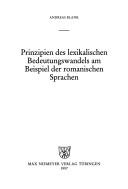
ISBN: 3484522852 3110931605 9783484522855 Year: 1997 Volume: 285 Publisher: Tübingen: Niemeyer,
Abstract | Keywords | Export | Availability | Bookmark
 Loading...
Loading...Choose an application
- Reference Manager
- EndNote
- RefWorks (Direct export to RefWorks)
Das bis in die jüngste Zeit gültige Referenzwerk zum Bedeutungswandel, Stephen Ullmanns "Principles of Semantics", datiert aus den 50er Jahren. Die vorliegende Studie versteht sich als ein kritisch an Ullmann anknüpfender Neubeginn, mit dem Ziel einer am heutigen Erkenntnisstand der Linguistik ausgerichteten Erarbeitung übereinzelsprachlicher Prinzipien der semantischen Innovation. Als Materialbasis dient der romanische Wortschatz, ergänzt durch viele Beispiele aus dem Englischen, dem Deutschen sowie anderen Sprachen. Die reiche Forschungstradition wird dabei in die neuere kognitiv-semantische und pragmatische Forschung eingebunden. Die entwickelte Theorie fußt auf einem einzelsprachliches und konzeptuelles Wissen integrierenden sechsstufigen Modell der Bedeutung, einem analog konzipierten fünfseitigen semiotischen Modell sowie auf den drei psychologischen Assoziationsprinzipien Similarität, Kontrast und Kontiguität. Auf dieser Grundlage können die Verlaufsmöglichkeiten sowie die verschiedenen sprachlichen Verfahren des Bedeutungswandels (z.B. Metonymie, Metapher, Ellipse) beschrieben und typologisiert werden. Des weiteren werden die Motive der Sprecher für semantische Innovationen völlig neu geordnet. Schließlich wird die Polysemie als synchrones Abbild des Bedeutungswandels eingehend diskutiert. Alle behandelten Beispiele werden in einem Anhang unter Angabe des Motivs der Innovation, der zugrundeliegenden psychologischen Assoziation und des verwendeten sprachlichen Verfahrens aufgeführt.
Lexicology. Semantics --- Romance languages --- Langues romanes --- Semantics. --- Vocabulary. --- Sémantique --- Vocabulaire --- Semantics --- Vocabulary --- -Romance languages --- -Neo-Latin languages --- Italic languages and dialects --- -Semantics --- Sémantique --- Neo-Latin languages --- Romance languages - Semantics --- Romance languages - Vocabulary --- Lexicologie romane
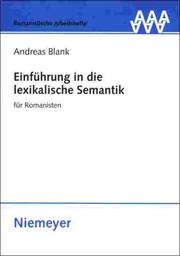
ISSN: 0344676X ISBN: 3484540451 3110957361 9783484540453 Year: 2001 Volume: 45 Publisher: Tübingen: Max Niemeyer,
Abstract | Keywords | Export | Availability | Bookmark
 Loading...
Loading...Choose an application
- Reference Manager
- EndNote
- RefWorks (Direct export to RefWorks)
This students' manual provides an introductory overview of lexical semantics based on the present state of theoretical discussion. It explains important 'basics' such as lexical relations, the distinction between polysemy and homonymy, and the problems posed by the concept of 'meaning'. Alongside structural semantics and semantic approaches of a generative persuasion, the book also gives an introduction to cognitive semantics (with special reference to prototype theory and the scenes-and-frames approach). The manual also gives detailed coverage of historical semantics: fundamentals, typology and motives of meaning change, and - in a broader perspective - various kinds of lexical change, including word-formation, loan-words, etc.
Lexicology. Semantics --- Etymology --- French language --- Comparative linguistics --- 804.0-56 --- Romance languages --- -Neo-Latin languages --- Italic languages and dialects --- Frans: syntaxis; semantiek --- Semantics --- Semantics. --- -Frans: syntaxis; semantiek --- 804.0-56 Frans: syntaxis; semantiek --- -804.0-56 Frans: syntaxis; semantiek --- Neo-Latin languages --- Romance languages - Semantics.
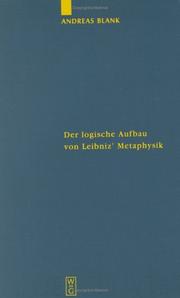
ISBN: 3110168782 3111790487 3110882388 9783110168785 Year: 2001 Volume: 51 Publisher: Berlin: de Gruyter,
Abstract | Keywords | Export | Availability | Bookmark
 Loading...
Loading...Choose an application
- Reference Manager
- EndNote
- RefWorks (Direct export to RefWorks)
Metafysica --- Metaphysics --- Métaphysique --- Metaphysics. --- God --- Ontology --- Philosophy --- Philosophy of mind --- Leibniz, Gottfried Wilhelm Freiherr von --- Leibniz, Gottfried Wilhelm, Freiherr von --- Leibniz, Gottfried Wilhelm,
Book
ISBN: 9783884051153 Year: 2015 Publisher: Munchen Philosophia
Abstract | Keywords | Export | Availability | Bookmark
 Loading...
Loading...Choose an application
- Reference Manager
- EndNote
- RefWorks (Direct export to RefWorks)
Book
ISBN: 3884050893 Year: 2005 Publisher: München Philosophia
Abstract | Keywords | Export | Availability | Bookmark
 Loading...
Loading...Choose an application
- Reference Manager
- EndNote
- RefWorks (Direct export to RefWorks)
Metaphysics --- Leibniz, Gottfried Wilhelm --- Contributions in metaphysics.
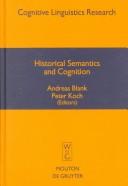
ISBN: 9783110804195 3110166143 1306273013 3110804190 9783110166149 Year: 2013 Volume: 13 Publisher: Berlin ; Boston : De Gruyter Mouton,
Abstract | Keywords | Export | Availability | Bookmark
 Loading...
Loading...Choose an application
- Reference Manager
- EndNote
- RefWorks (Direct export to RefWorks)
No detailed description available for "Historical Semantics and Cognition".
Semantics, Historical --- Cognition. --- Psychological aspects. --- Sémantique historique --- -Historical lexicology --- -Psychological aspects --- -Psychology --- Historical lexicology --- Sémantique historique --- REFERENCE --- Cognition --- Semantics, Historical. --- Psychology --- Historical semantics --- Psychological aspects --- General --- Languages & Literatures --- Philology & Linguistics --- Lexicology. Semantics --- Psycholinguistics --- Historical linguistics --- Philology.
Book
ISBN: 9783030697099 9783030697105 9783030697112 9783030697082 3030697088 3030697096 Year: 2021 Publisher: Cham: Springer,
Abstract | Keywords | Export | Availability | Bookmark
 Loading...
Loading...Choose an application
- Reference Manager
- EndNote
- RefWorks (Direct export to RefWorks)
The volume analyzes the natural philosophical accounts and debates concerning the vegetative powers, namely nutrition, growth, and reproduction. While principally focusing on the early modern approaches to the lower functions of the soul, readers will discover the roots of these approaches back to the Ancient times, as the volume highlights the role of three strands that help shape the study of life in the Medieval and early modern natural philosophies. From late antiquity to the early modern period, the vegetative soul and its cognate concepts have played a substantial role in specifying life, living functions, and living bodies, sometimes blurring the line between living and non-living nature, and, at other moments, resulting in a strong restriction of life to a mechanical system of operations and powers. Unearthing the history of the vegetative soul as a shrub of interconnected concepts, the 24 contributions of the volume fill a crucial gap in scholarship, ultimately outlining the importance of vegetal processes of incessant proliferation, generation, and organic growth as the roots of life in natural philosophical interpretations.
Philosophy of science --- History of philosophy --- Pure sciences. Natural sciences (general) --- Biology --- History of human medicine --- wetenschapsgeschiedenis --- biologie --- filosofie --- geneeskunde --- geschiedenis --- wetenschapsfilosofie --- Philosophy --- Science --- Medicine --- Life sciences. --- Plants (Philosophy) --- History. --- History of Philosophy. --- History of Science. --- History of Medicine. --- Philosophy of Science. --- Life Sciences. --- Philosophy.
Multi
ISBN: 9783030697099 9783030697105 9783030697112 9783030697082 Year: 2021 Publisher: Cham Springer
Abstract | Keywords | Export | Availability | Bookmark
 Loading...
Loading...Choose an application
- Reference Manager
- EndNote
- RefWorks (Direct export to RefWorks)
The volume analyzes the natural philosophical accounts and debates concerning the vegetative powers, namely nutrition, growth, and reproduction. While principally focusing on the early modern approaches to the lower functions of the soul, readers will discover the roots of these approaches back to the Ancient times, as the volume highlights the role of three strands that help shape the study of life in the Medieval and early modern natural philosophies. From late antiquity to the early modern period, the vegetative soul and its cognate concepts have played a substantial role in specifying life, living functions, and living bodies, sometimes blurring the line between living and non-living nature, and, at other moments, resulting in a strong restriction of life to a mechanical system of operations and powers. Unearthing the history of the vegetative soul as a shrub of interconnected concepts, the 24 contributions of the volume fill a crucial gap in scholarship, ultimately outlining the importance of vegetal processes of incessant proliferation, generation, and organic growth as the roots of life in natural philosophical interpretations.
Philosophy of science --- History of philosophy --- Pure sciences. Natural sciences (general) --- Biology --- History of human medicine --- wetenschapsgeschiedenis --- biologie --- filosofie --- geneeskunde --- geschiedenis --- wetenschapsfilosofie --- Philosophy --- Science --- Medicine --- Life sciences. --- Plants (Philosophy) --- History.
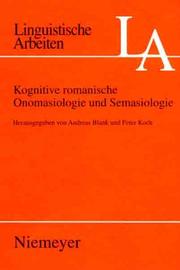
ISBN: 3484304677 3111822982 3110911620 Year: 2003 Volume: 467
Abstract | Keywords | Export | Availability | Bookmark
 Loading...
Loading...Choose an application
- Reference Manager
- EndNote
- RefWorks (Direct export to RefWorks)
Dieser Sammelband zeigt anhand von Problemen der Lexik und Grammatik romanischer Sprachen sowie der linguistischen Metasprache, daß die onomasiologische und die semasiologische Perspektive in ihrer Komplementarität unabdingbare Bezugspunkte einer sich als 'kognitiv' verstehenden Sprachwissenschaft sein sollten. Mit im Detail unterschiedlicher Perspektivierung werden Fragen der synchronischen und diachronischen Lexikologie und Grammatik diskutiert, ausgewählte Konzept- bzw. Funktionsbereiche im Detail analysiert und Probleme der Grammatikographie und der Konzeptualisierung von Sprache beleuchtet. With reference to problems of lexis and grammar in the Romance languages and of metalinguistics in general, the articles collected in this volume demonstrate that in their complementarity the onomasiological and semasiological perspectives represent indispensable points of reference in any form of linguistics regarding itself as 'cognitive'. With some slight differences in perspective, the articles discuss issues posed by synchronic and diachronic lexicology and grammar, analyzing selected conceptual and functional areas in detail and casting light on problems of grammatology and the conceptualization of language.
Lexicology. Semantics --- Philosophy of language --- French language --- Grammar --- Onomasiology. --- Romance languages --- Semantics. --- Onomasiology --- Naming (Semantics) --- Nomination (Semantics) --- Semantics --- Semiotics
| Listing 1 - 9 of 9 |
Sort by
|

 Search
Search Feedback
Feedback About UniCat
About UniCat  Help
Help News
News